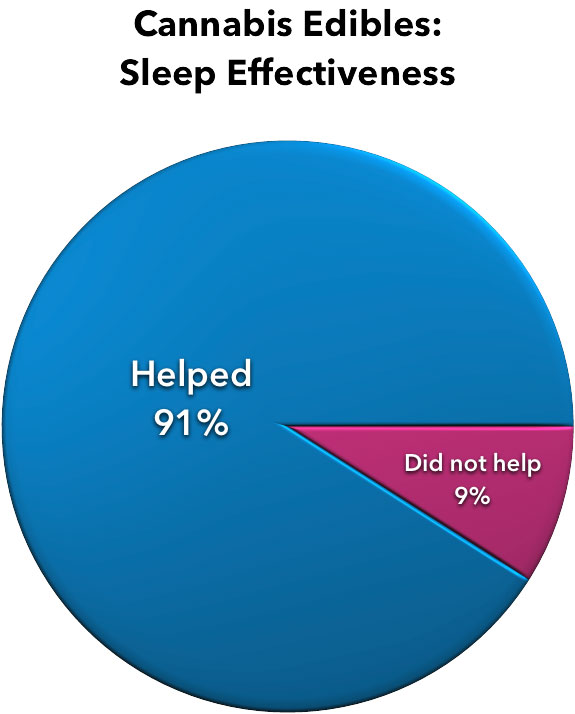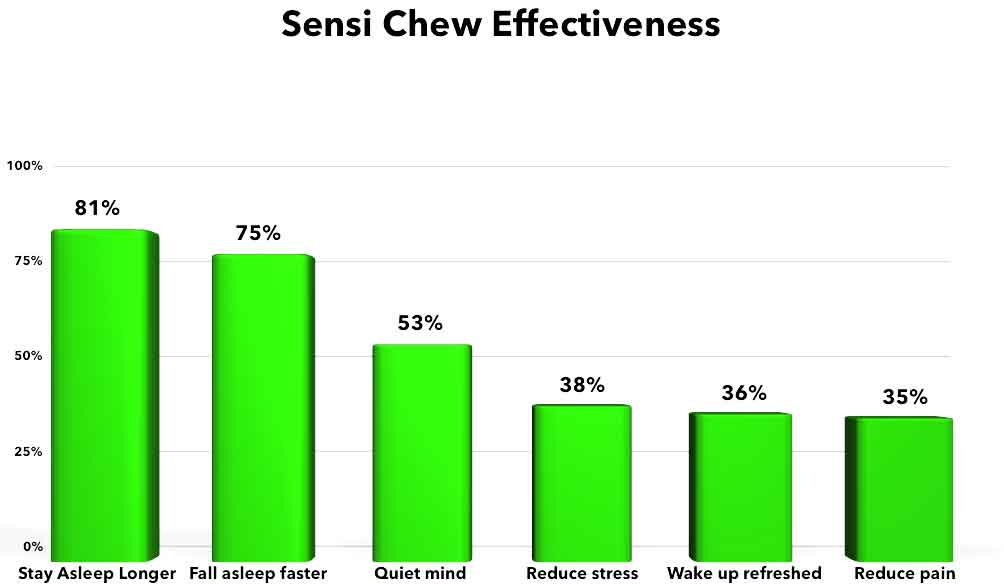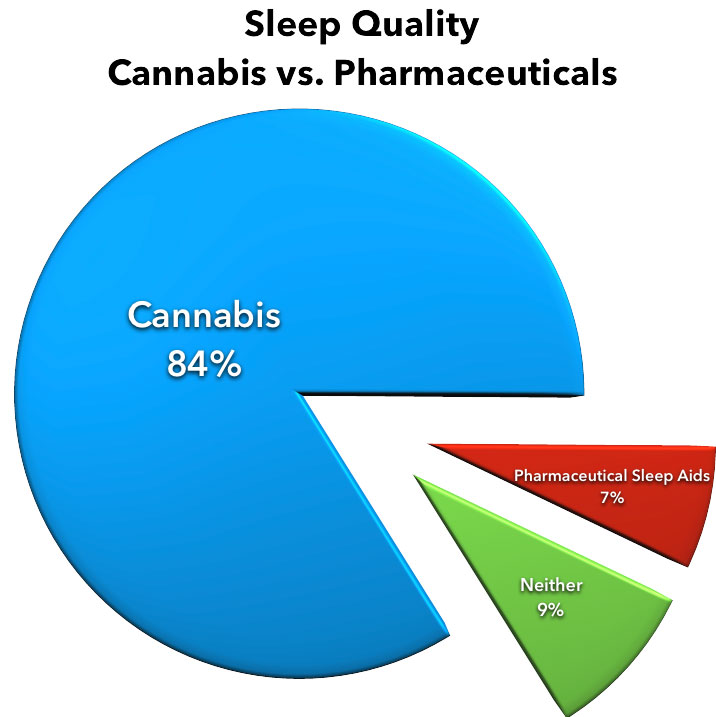If you’re having trouble sleeping, you’re not alone. Failing to get a good night’s sleep can have big impacts on your life, functionality and sense of well-being, but it’s not always easy to find a solution. That’s part of why many are now wondering whether cannabis might be an effective treatment for sleep disorders. The connection between cannabis and sleep is strong, and has a long history. Humans have been utilizing cannabis as a sleep aid since ancient times.
Recent surveys of cannabis users also support the idea that cannabis can help with sleep. In one 2018 survey of 1,000 cannabis users, 74% of respondents said they used cannabis to help them sleep, and of those who used it for sleep 84% said that it helped. And meta-reviews of the scientific literature on cannabis and sleep report that there is evidence that cannabis can improve sleep quality – particularly for those with conditions like sleep apnea, multiple sclerosis, fibromyalgia, chronic pain, and PTSD.
Still, there are many questions about cannabis and sleep left unanswered. So Sensi Products, a California-based cannabis manufacturer with products geared toward helping with sleep (such as Sensi Chew Insomnia with THC and Sensi Chew Insomnia Plus with CBD) launched a new study in the hopes of gaining more insight into sleep issues and cannabis’ impact on them. “Over the past 5 years we’ve interviewed nearly two thousand consumers who struggle with insomnia and lack of sleep” explains Lisa Tollner, Co-Founder and CSMO at Sensi Products. “Most studies only scratched the surface and we wanted a deeper understanding of what the consumer is going through and why they are looking to cannabis as a possible solution which is an essential piece of the sleep puzzle.”
“This sleep study by Sensi Products produced some fascinating insights that we haven’t seen in past studies on cannabis and sleep. In particular, the high approval rating of cannabis edibles for sleep is an interesting result that should be followed up on. Future research should investigate whether cannabis edibles might provide an especially efficacious route to sleep improvements – as this study suggests” states Emily Earlenbaugh, PhD writer and cannabis educator.
Expanding on the work from previous sleep studies, this survey study looks at a variety of sleep related variables, such as sleep patterns, reasons for not sleeping, different types of cannabis use, use of other medications, and lifestyle factors like exercise, with the intention of getting a more holistic picture of the factors impacting sleep.
Sleep Survey Methodology
The Sensi Products Sleep Survey is an online survey that was posted on sensiproducts.com on April 1st 2019. At the time of publishing this report, it had 264 anonymous respondents (who found the survey online) and it is still up and collecting data. Respondents were asked to answer a series of multiple choice or fill-in-the-blank style questions related to cannabis and sleep.
Demographic Information
Since the survey was online, there were no restrictions to participation in the study but some information was collected to give a picture of who was responding. For the most part (72.6%) respondents were California residents. Respondents varied in age between 21 and 77 with an average age of 45, and 61% were female while 39% were male. Most (70%) were employed, with only 18% retired and 10% unemployed.
Some information was also collected In terms of sleep related lifestyle habits. For example, 17% of respondents reported taking naps during the day, and 78% reported weekly exercise, most commonly for 30-35 minutes (42%) or 45-60 minutes (26%), 3(25%) or 4(15%) days a week. 22% reported that they do not exercise.
Sleep Issues
In addition, most respondents had one thing in common – difficulty with sleep. And this survey looked in-depth at the particular sleep issues respondents suffered from. Many had challenges falling or staying asleep – and factors like stress and worry seemed to play a big role.
For example, 83% said they had trouble falling asleep, with 47% of these respondents reporting that it takes over an hour for them to fall asleep, and 24% reporting between 45 minutes to an hour to get to sleep. When asked why they had trouble getting to sleep, the most common response (83%) was an active mind, followed by an inability to relax (60%), stress (58%) and pain (40%).
But falling asleep wasn’t the only problem. 87% of respondents said they had trouble staying asleep, with 58% reporting waking up 3 or more times a night and 34% reporting 2 sleep interruptions a night. The majority of these respondents (61%) said that stress and worry were causing their sleep disruption, while 51% said it was urge to use the bathroom, and 28% reported being woken by dreams or nightmares.
38% of respondents even noted that they’ve had sleep issues for 10 or more years.
Using Cannabis Edibles as a Sleep Aid
When it came to using cannabis as a sleep aid, many (70%) said that they have used cannabis to help with sleep, and using an edible was the most commonly reported way of taking cannabis for sleep (73%), with 58% smoking and 34% using a tincture.
In perhaps the most impressive result of the study, a full 91% of those who reported using cannabis edibles to sleep said that it was effective at helping them sleep. This could be indicative that cannabis edibles are a particularly effective strategy for sleep, since this is a slightly higher number than we’ve seen in previous surveys of cannabis’ effectiveness for sleep (which put the number at 84% for cannabis in general).

Of those who found cannabis edibles effective, in the current study, 84% said it helped them fall asleep, while 67% said it helped them to stay asleep, showing improvement in the two most commonly reported sleep issues.
To get a more in-depth picture of how people were using cannabis edibles for sleep, respondents were also asked about the dosing and chemical composition of the edibles they used.
In general, respondents kept dosing low, although higher levels of THC intake were more common. 5-10 mg’s was the most commonly mentioned dosage for both CBD (27%) and THC (42%) in edibles. This makes sense since this is often the recommended dose for commercial edible products. When it came to the THC in edibles, only 13% reported dosing that exceeded 25mg’s, with 15% somewhere in between 11-25mg’s. With CBD, only 4% reported dosing higher than 25mg’s, with 14% in the 11-25mg range.
Notably, a large portion of respondents couldn’t remember what dose they took for either CBD (28%) or THC (21%). In addition, the survey found that using THC alone for sleep was more common than using CBD alone. 6% used edibles without any THC, but 24% reported using edibles without CBD.
Respondents were also asked about their experience with Sensi Chews (a cannabis infused chocolate caramel produced by Sensi Products). Of the 45% of respondents that had already tried Sensi Chews, 70% said that it was more effective for sleep than other cannabis products, while only 4 percent said they had found it less effective. Sensi Chew Insomnia with THC was the most commonly used of these products (70%), followed by Sensi Chew Indica (27%), and Sensi Chew Insomnia Plus with CBD (21%).
Those who found Sensi Chews more effective reported that it helped them to stay asleep longer (81%), fall asleep faster (75%), quiet their mind (53%), reduce stress (38%), wake up refreshed (36%) and reduce pain (35%).

Interestingly, respondents also reported less negative side effects (such as grogginess, anxiety or being too high) with Sensi Chews. While only 10% of respondents reported negative effects with Sensi Chews, 22% reported negative effects from cannabis in general.
Cannabis vs Pharmaceutical Sleep Aids
This study also looked at how cannabis compares to pharmaceutical sleep aids. Almost half of the respondents (49%) had tried a pharmaceutical sleep aid, most commonly (33%) for 5 years or more, or for only 1-6 months (25%). The majority used Ambien (59%) or Lunesta (20%).
For those respondents that used pharmaceutical aids, 33% developed dependencies and 49% experienced additional negative side effects such as grogginess (26%), sleep walking (8%) and memory loss (6%).
Comparatively, with cannabis, only 22% experienced negative side effects, such as grogginess (18%), hangover (16%), restless sleep (13%), headaches (13%), and drowsiness (9%).
Notably, when asked whether the quality of their sleep was better with cannabis or traditional pharmaceutical sleep aids, 84% of those have who used both cannabis and pharmaceutical sleep aids answered that their sleep was better with cannabis, while only 7% of these said pharmaceuticals worked better. Some also reported additional benefits of using cannabis rather than a sleep aid, such as sleeping longer (74%), and enhanced happiness (56%), emotional balance (53%), productivity (51%), focus (46%), creativity (35%), memory (30%) and motor skills (24%).
 Those who didn’t use cannabis as a sleep aid, most often (54%) said they decided not to use it because they didn’t know it helped aid in sleep. But others were worried about it’s effects (32%), didn’t want to feel high (24%), were concerned about drug testing at their job (22%) or didn’t want to feel judged by others (9%).
Those who didn’t use cannabis as a sleep aid, most often (54%) said they decided not to use it because they didn’t know it helped aid in sleep. But others were worried about it’s effects (32%), didn’t want to feel high (24%), were concerned about drug testing at their job (22%) or didn’t want to feel judged by others (9%).
Conclusion
This anonymous online survey provides a lot of insight into the first hand experience of insomnia sufferers, and how cannabis is being used to aid their sleep. Notably, the large majority of patients with sleep issues in this study had a preference for using cannabis over pharmaceutical sleep aids, and experienced improved results when using cannabis options. The study also demonstrated that respondents preferred taking cannabis in the form of edibles to deal with their sleep issues – with 91% reporting cannabis edibles are effective for improving sleep. Moreover, the majority of respondents who had tried Sensi Chews showed a distinct preference for Sensi Chews over other types of cannabis, reporting better sleep and fewer negative side effects than with cannabis in general.
Survey methodology is limited in general, with issues like placebo effect sometimes clouding the results, so clinical studies are needed to confirm these findings on how cannabis impacts sleep. Still these results do point towards cannabis edibles (and Sensi Chews in particular) as a viable treatment for sleep disorders, and perhaps one with better results for patients than the current pharmaceutical options. Future clinical studies could follow up on these results by investigating the impact of different cannabis edible formulations on sleep in a controlled, double blind study.

